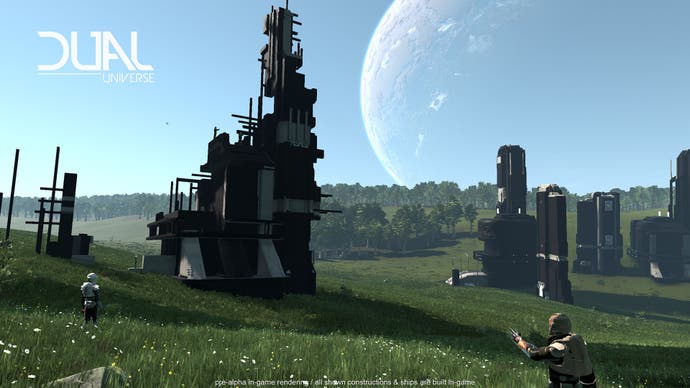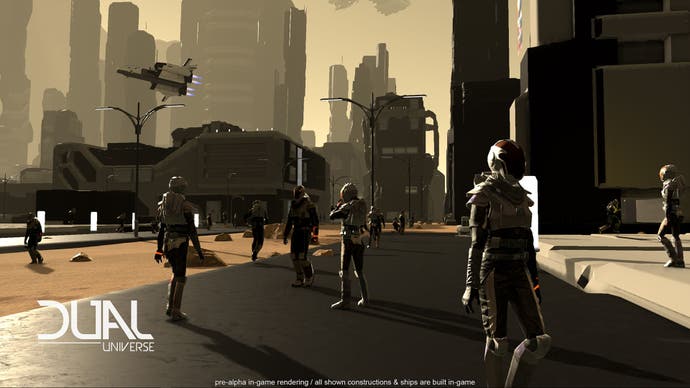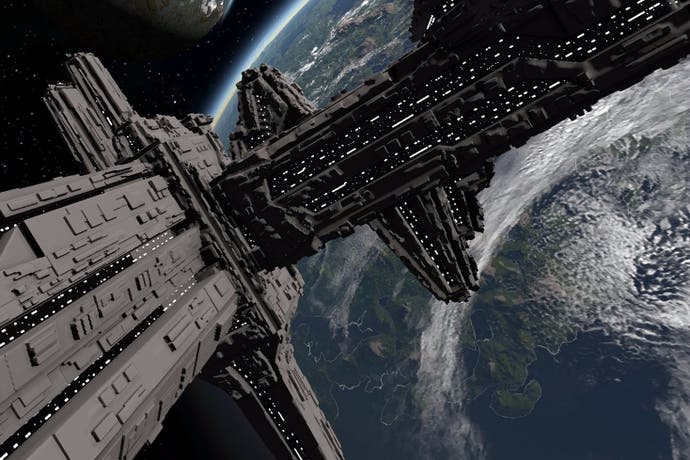Building a space sim in a post-No Man's Sky world
"It has hurt us, very clearly."
There's ambition and then there's this; sheer naked madness, seemingly matched to some kind of genius. Dual Universe is an impossible game - impossible because it's hard to comprehend how something like this could possibly exist. An amalgamation of Eve Online and Minecraft, it's a single shard MMO where countless numbers of players can get together in a shared universe to create, to spectate, to get lost in the inevitable politics that emerge when you give humans whole planets to mine and to sculpt and to exploit or explore as they see fit. It's one of the most ambitious games I've seen not just this year but any year, a thing of raw wonder that, going from the short technical demo that ably shows how thin are the seams that hold its solar system together, actually works.
Dual Universe is an exciting prospect, then, but it's got a big problem. After player expectations around No Man's Sky were brought crashing down to earth, it's hard getting people excited for another space sim. It's not really advisable to promise too much, lest you find yourself setting up the same traps Hello Games sprung after the release of its much anticipated game. It's a problem that developer Dual Universe is currently wrestling with right now as it tries to get the Kickstarter for its game over the line.

"No Man's Sky has hurt us, very clearly," Jean-Christophe Baillie, an impeccably smart looking Frenchman, tells me as he finishes his short demo of Dual Universe in action. "This is a post-No Man's Sky era. People cannot do the same thing. There's a huge amount of distrust in the community. As you know we're doing a Kickstarter, and half of the comments are like this is just No Man's Sky all over again. We're struggling. We're not quite there yet because of that. Our statement is we totally understand what's going on, and our policy is to be totally transparent.
"We're not saying anything that is not true. We're stating the facts. We have this technology, but it's going to be released at the end of 2018. There's all sorts of bad news, and we're saying it! And we have these questions from the community, and we want to answer all of them. We want to be absolutely transparent.
"The game's not yet here, so there's a risk - there's the risk that we can't deliver, there are all sorts of risks - but there's the risk that it's this great game that is innovating and bringing something new. What we want to say to the community is don't throw everything into the No Man's Sky thing. You have to increase your level of demand, on which you're be able to base your decision to back the game. If you say no all the time, we won't be able to innovate. There's an age of maturity that is approaching, people are realising they have to be careful about what they support, they shouldn't take words for granted. We're okay with that, and we want to be transparent and open."
They're soothing words in the hostile environment that Dual Universe finds itself in. But who, exactly, are the developers Novaquark? Who, more tellingly, is Baillie, a man with next to no experience in the games industry before Dual Universe? He's got an unlikely background - working in AI and robotics, he's already had a successful career having sold a company to SoftBank a few years back. Baillie is a technologist, too - that's a term you can probably apply to so many smart games developers, but in Baillie's case it's a level of tinkering and invention that led to the creation of the server technology that underpins Dual Universe.
An unconventional CV, for sure, though it's a thrilling foundation for a game's development. "If you want to draw a line, there is one that exists," Baillie says of what ties together his previous work with his current project. "The gameplay is all about emergence, putting the simple building blocks you assemble, recombine and build some huge things with simple mechanics. That's something I used to do in AI - I wanted to look at how intelligence emerges from simple mechanics and principles. There's a way of thinking, a way of looking at problems, that I got from this past."
I think that's what excites me the most about Dual Universe - it's an outsider's game, with an outsider's touch and not burdened with the baggage of so many games. Sometimes, all you need to bring life to a well-worn genre is a fresh perspective.
So, with all that out the way, let's ask that all-important question. What is you actually do in Dual Universe? Plenty, of course. It's a continuous single shard universe that can be shared by millions, and one you'll embark upon as part of the game's backstory about humanity fleeing a destroyed Earth. From there, you'll be able to leave the Ark that carries you to travel around a safe zone - one that's some 20km wide - where you can't be attacked. Beyond that, though, is where it gets really interesting. The pitch, and the driving force behind your actions is simply to rebuild humanity as you see fit. "Have you read Ready Player One?" asks Baillie. "We're building the OASIS."
At the heart of Dual Universe is simple Minecraft-esque crafting and creation (it's important to note that in this universe you're not limited to building blocks, however - spheres help lend your creations a more gentle edge). "'We don't have content, predefined things," explains Baillie. "People will be able to build whatever they want. There's a voxel technology, similar to Everquest Landmark. It allows people to sculpt, play the way they want."

You can build space stations and ships out of the resources you require, sculpting all-new shapes and then adding pre-made components that help define their characteristics - place a certain propulsion system in a certain place and a craft will handle differently, for example. The idea is that some people will specialise in shipbuilding, going on to share their creations and sell them for profit as they set up their own business. That's when someone might need a large space station to house all of those ships. Perhaps you'll also need to employ people to build that space station, a process which could take months, or to deliver its goods to customers, traversing the solar system and dealing with any pirates that might be touring the sector. They might become part of a guild - or, as it is in Dual Universe, an organisation which can be set up as a democracy, a dictatorship or a company for profit. Baillie seems keen to embrace all the possibilities that spring forth from Dual Universe's fundamentals.
We're getting carried away again though. There are countless possibilities, but Dual Universe is adamant it's going to start small, offering at first a single solar system of some 10 or 20 planets that can then be expanded upon over time via star gates. "Star gates are super expensive in the game," says Baillie. "They take a lot of effort, a lot of time. You'd have to send a probe that travels at the speed of light, so it'll take one week to a month to get where you want it to go. It forces you to think strategically, and allows the universe to grow organically."
Maybe that's going to be Dual Universe's smartest move, expanding slowly and letting its simple foundation flourish in new, surprising ways. At present it's a demo, some smart technology matched by a willingness to see it evolve, but already people have excitedly clambered on-board, filling the game's forums with scraps of lore and organisations that are already being assembled. "I'm very excited by this," says Baillie. "If we give them the right tools they can build this amazing fantasy world. it can go beyond gaming. This world can come alive, and we can get people to visit, to go there - even non-gamers. That's a long-term view. We can open the door of the world to visitors." For a man who's promised to keep himself grounded, Baillie's got some wonderfully lofty ideas for his game. That will all come in time, though. "Let's talk about all that in five to ten years..."


